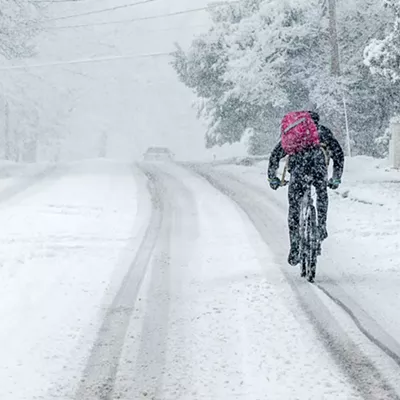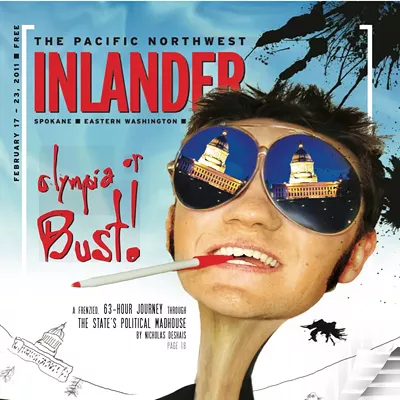A man enters, shows his identification and clocks in. He is in a locked room, surrounded by gleaming white surfaces, and in a few moments he’ll clock out and leave, just as discreetly as he entered. In a hermetically sealed package he will be carrying what, in a different context, the federal government considers to be one of the most harmful substances a human can ingest.
It’s cannabis — medical marijuana — and the man just picked it up from Jacey Hoag, the man behind the Wellness Medicine Collective. The deal was lawful, the medicine legal, and relationships like this are beginning to pop up all over Spokane. So much so, in fact, that four local dispensaries have joined into a loose-knit association — they’re matching prices, sharing legal advice and basically showing strength in numbers. And on Sunday they named Hoag as the association’s leader.
There’s no name for the group, but those involved do want recognition, as law-abiding members of the taxpaying business community.
“We’ve got good legal advice. We have good accountants. And we realize that documentation is everything. Everything,” says Rhonda Duncan. Duncan is co-owner of Club Compassion, one of the dispensaries in the group located on Nevada and Bridgeport. “We keep all our receipts, and records from all of our vendors.” She pauses. “It just doesn’t fall out of the sky, you know,” she adds, smiling.
As for taxes, Duncan says her dispensary has that taken care of. “We already have four [thousand] put away for them.”
Inside Duncan’s shop, patients are greeted by a large lobby filled with seats and the same dull art that decorates many doctors’ offices. In the back room, where only one patient is allowed at a time, a desk is arrayed with the club’s products. Seven varieties of cannabis, ranging from $12 to $15 a gram. Joints for $5. Tinctures and creams for $25. One cream smells edible, like coconut and mint, though it’s not. Rub it into a pained spot and the pain goes away “like instantly,” says Robert Brocklehurst, another owner. A green teddy bear lollipop sits in a jar.
Almost 30 people patronize the club everyday, reliant on the diversity and consistency of product. Since most of them live on disability, or have limited ability to work and earn money, many patients buy a gram or two at a time. But another 15 percent to 20 percent of their customers purchase the club’s weekly limit of 28 grams when they visit. “Our prices, we’re meeting or beating the street right now,” says Duncan.
On Friday, with the phone ringing around them, Duncan and Brocklehurst were waiting for their membership tally to reach 200. They had a gift bag waiting for the lucky patient. The dong rang, signaling that someone had arrived, and Brocklehurst looked out. A new patient had walked in the door. “That’s 200,” he said, grinning wildly.
Over on the main drag in Hillyard, it’s pretty much the same story for Chantel Jackson, who opened the Human Connection with her husband, Bill. Despite the heavy construction — Market Street has been reduced to rubble on its way to tree-lined restoration — they’ve signed up more than 250 patients since opening July 6.
“The reason we’re here, the only reason we’re here, is for the patients,” says Jackson, who is training to become a nurse. Different varieties are helpful with different illnesses, she adds, and she knows how to mix and match. “I sit here and we figure it out. Sometimes they don’t know what to get.”
To keep her patients out of trouble, when they come to the back room, they do so one at a time. Jackson clocks them in with a standard time clock. They identify what they want, and Jackson seals it in an airtight and secure package. When the patients leave, Jackson clocks them out. The time clock proves she’s only helped one patient at a time, keeping to the letter of the law. It’s a system she took from Hoag and the Wellness Medicine Collective’s playbook.
Hoag — the mastermind behind all this legal maneuvering — says he has a holistic approach to medicine, of which marijuana plays only one part of many. In his building’s lobby, a corkboard hangs with informative fliers about Noni juice, “the essential role of fruits and vegetables” and SuperSea Plus. He has a fridge ready to be stocked with probiotic supplements.
He’s familiar with nontraditional medicine derived from non-Western sources. But he’s also familiar with the law.
Three months ago, Hoag says, his home was raided and the cops took what plants, pot and equipment he had. He says he was within his legal rights as a patient — not too many plants or pot — but the cops shot him in the back with a bean bag shotgun anyway, leaving a golf ball-sized blemish.
The raid didn’t leave him with any resentment, he says, just the desire to help people get “their medicine” without having to fear the law. “I always knew I wanted to help people. But once I got shot, it confirmed that I could help people by helping them get [medicinal marijuana] and by protecting them from getting shot.”
When he opened the collective in early July, he sent a letter to all local law enforcement agencies “humbly [requesting] any thoughts that may lead to a better method of operation.” None took him up on his offer, but he says it still stands. “I want them to tell me what I’m doing wrong and what I’m doing right.”
The dispensaries in the association have a total of about 700 patients signed up, but that doesn’t take into account any overlap if a patient is registered at all three. It’s a lot of patients, but nothing close the number who go to Change, a dispensary on Northwest Boulevard. Change is not part of the association and serves more than 1,000 patients.
On Monday, Change’s lobby was filled with a half-dozen people — owners, volunteers, various hangers on — all upset about the weekend’s bad news. Scott Shupe, one of the owners, had heard about some “really good medicine” in Oregon and went down to pick it up. He got stopped in The Dalles and state police confiscated the pot and all his cash, “the state of Washington’s tax money” — all told worth about $39,000, Shupe says. Christopher Stevens, a Change owner who recently lost his bid to join the Spokane City Council, went down to bail him out, for another $8,000.
Bad news considered, the shop had the feel of a hangout, rather than a clinic. The lobby had no chairs. In the back room, where patients were supposed to buy their medicine one on one, the sounds of laughing and music poured forth, at one point closely followed by a thick cloud of marijuana smoke.
When asked why his dispensary didn’t join the association — which might provide the group with some legal advice, if nothing else — Matt Guglielmino, the dispensary’s “consultant,” said his group didn’t see the benefits. They set prices according to how much they paid farmers, had their own legal advice and were doing just fine. The $10,000 they just paid to the state in sales tax showed their success.
When it was suggested that the dispensary was lacking the professionalism of the other dispensaries, Guglielmino said the “gray area” of the law left how a dispensary should be run up to interpretation.
“Nobody’s in the wrong here,” he said. “Just nothing’s right.”
























